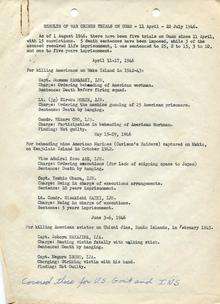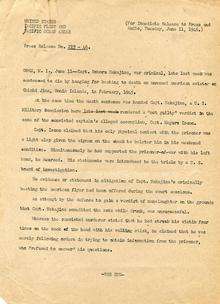Chichijima incident


The Chichijima incident (also known as the Ogasawara incident) occurred in late 1944, when Japanese soldiers killed and consumed five American airmen on Chichi Jima, in the Bonin Islands.
Incident
Nine airmen escaped from their planes after being shot down during bombing raids on Chichi Jima, a tiny island 700 miles (1,100 km) south of Tokyo, in September 1944. Eight were captured. The ninth, the only one to evade capture, was future US President George H. W. Bush, then a 20-year-old pilot.[1]
After the war it was discovered that the captured airmen had been beaten and tortured before being executed. The airmen were beheaded on the orders of Lt Gen. Yoshio Tachibana (立花芳夫, Tachibana Yoshio). American authorities claimed that Japanese officers then ate parts of the bodies of four of the men.
Trials
Tachibana, alongside 11 other Japanese personnel, was tried in August 1946 in relation to the execution of U.S. Navy airmen, and the cannibalism of at least one of them, during August 1944. Because military and international law did not specifically deal with cannibalism, they were tried for murder and "prevention of honorable burial".
This case was investigated in 1947 in a war crimes trial, and of 30 Japanese soldiers prosecuted, five (Maj. Matoba, Gen. Tachibana, Adm. Mori, Capt. Yoshii, and Dr. Teraki) were found guilty.[2] Tachibana was sentenced to death, and hanged.[3]
Book
In the best-selling book Flyboys: A True Story of Courage, American author James Bradley details several instances of cannibalism of World War II Allied prisoners by their Japanese captors.[4] Bradley claims that this included not only ritual cannibalization of the livers of freshly killed prisoners, but also the cannibalization-for-sustenance of living prisoners over the course of several days, amputating limbs only as needed to keep the meat fresh.[5]
Notes
- ↑ Laurence, Charles (October 26, 2003). "George Bush's comrades eaten by their Japanese PoW guards". The Telegraph. Retrieved 2014-11-15.
- ↑ Welch, JM (April 2002). "Without a Hangman, Without a Rope: Navy War Crimes Trials After World War II" (PDF). International Journal of Naval History. 1 (1). Cannibalism. Retrieved December 3, 2007.
- ↑ ''Case No. 21 Trial Of General Tomoyuki Yamashita[,] United States Military Commission, Manila, (8 October-7 December 1945), and the Supreme Court Of The United States (Judgments Delivered On 4 February 1946). Part VI Archived 8 December 2006 at the Wayback Machine. (Retrieved on December 18, 2006); Jeanie M. Welch, "Without a Hangman, Without a Rope: Navy War Crimes Trials After World War II", International Journal of Naval History, v.1, No. 1, April 2002, p. 5–6
- ↑ Bradley, James (2003). Flyboys: A True Story of Courage (1st ed.). Little, Brown and Company (Time Warner Book Group). ISBN 0-316-10584-8.
- ↑ Bradley, James (2004) [2003]. Flyboys: A True Story of Courage (softcover) (first ed.). Boston, Massachusetts: Back Bay Books. pp. 229–230, 311, 404. ISBN 0-316-15943-3. Retrieved December 26, 2007.